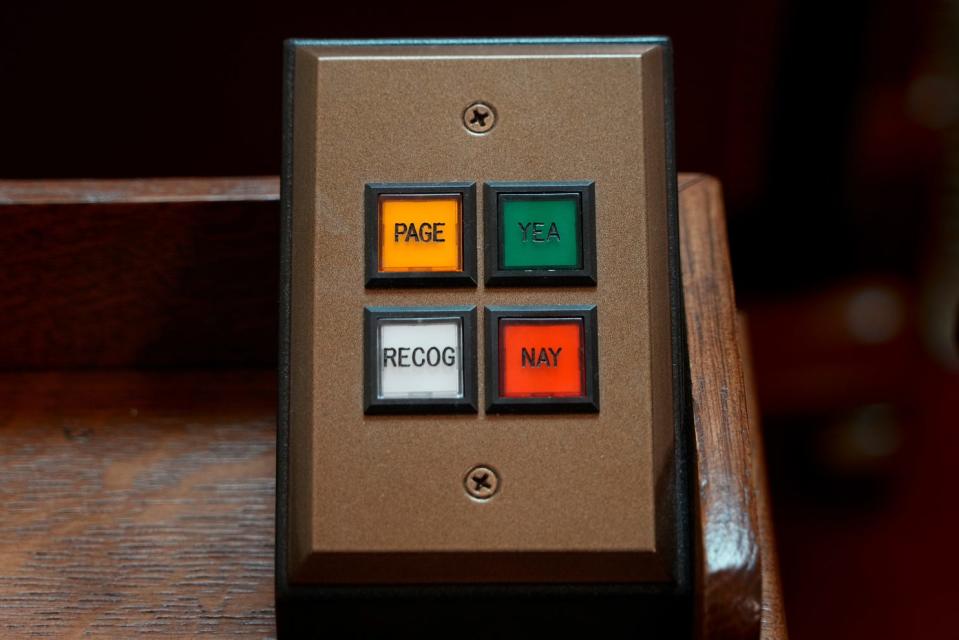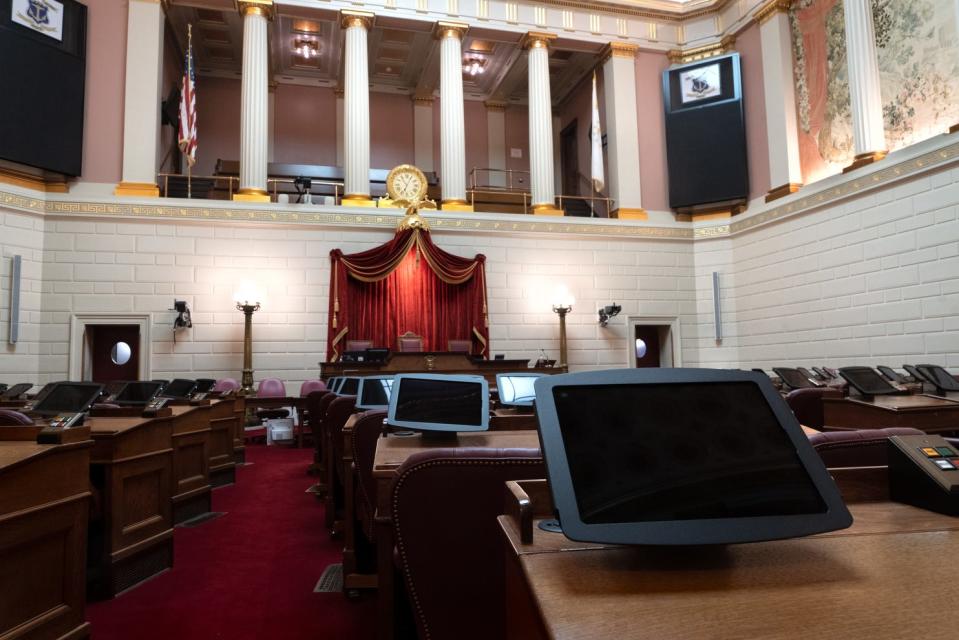The customs, quirks and unspoken rules that really decide how bills become law in RI
If you're reading this, you probably already know the basic Civics 101 explanation of how a bill becomes a law.
But each state legislature has its own distinctive customs and quirks, and, of course, Rhode Island is no exception.
For instance: Most bills get a hearing, regardless of their chance at passing. But when legislation actually goes up for a vote, the outcome is typically pre-ordained.
Below, you’ll find an overview of how lawmaking really happens. (One caveat: Rules can change depending on who’s in charge, and customs and norms aren’t set in stone, so this is only intended to capture how the process works at this particular moment in time.)

How bills get introduced
When a lawmaker introduces a bill, that doesn't necessarily mean that they came up with the idea – or even guarantee that they've read it.
Often, they'll put in legislation at the request of constituents, lobbyists, advocacy groups, state agencies, the cities and towns that they represent, or even the House speaker or Senate president. (Yes, you can contact your representatives and ask them to introduce a bill for you.)
Sometimes, lobbyists will hand lawmakers pre-written draft legislation that may simultaneously be introduced in a number of other states. Most of the time; however, lawmakers will bring an idea to the General Assembly's legislative counsel, commonly referred to as "leg counsel," where staff attorneys will turn it into a bill.
Lawmakers will often privately acknowledge that certain pieces of legislation are their "priority bills," and others are, well, not. Some will admit to submitting half-baked bills that they haven't fully thought through, in hopes of starting a conversation.
The committee process
Once a bill is introduced, it's assigned to a committee. Bills don't automatically receive a committee hearing, according to House spokesman Larry Berman and Senate spokesman Greg Pare, but the vast majority get one.
On the rare occasions when bills don't get a hearing, it's usually because the sponsor doesn't want one – perhaps because they're not all that interested, or they're having second thoughts about the legislation that they introduced.
Hearings are an opportunity for committee members to ask questions about the bill, and for members of the public to let lawmakers know what they think. (To learn how that process works, check out the ACLU of Rhode Island's Advocacy 101, Common Cause Rhode Island's Demystifying Democracy series, and the guide to testifying at hearings published by the secretary of state's office.)
At the start of each hearing in the House, committee members vote to hold all the bills "for further study" – a standard move that essentially means they're only discussing the bills, not voting on them. If a bill does go up for a vote, it will be at another meeting later on. (The Senate, however, will occasionally vote on bills on the same night that a hearing takes place.)
Most bills never get a vote and die a quiet death. If a bill reappears on a committee's agenda and is "scheduled for consideration," however, that's generally a guarantee that it's going to pass – unless unexpected hijinks ensue.
By then, the legislation may look slightly different: Lawmakers will sometimes tweak their bills to address concerns or make them more palatable. The revised version of a bill is commonly known as a "Sub A."

Moving to the House or Senate floor
Once a bill passes out of committee, it's up to the House speaker or Senate president to schedule it for a vote on the House or Senate floor. The timing is up to their discretion, Berman and Pare wrote in an email, but bills "generally come to the respective chambers within a few weeks of committee passage."
However, John Marion, executive director of Common Cause Rhode Island, pointed out that bills will sometimes pass out of committee in the waning days of the session but never make it to the floor before the legislature adjourns.
Floor votes are sometimes preceded by fiery debates, but they aren't very suspenseful. Generally, bills don't make it out of committee unless they also have enough support to pass on the floor.
Crossing over to the other chamber
Once a bill passes either the House or Senate, it then crosses over to the other chamber and has to go through the same process.
Every year, there are bills that pass the Senate but die in the House, and vice versa. In hopes of avoiding that outcome, lawmakers will often team up and introduce identical "companion bills" so that a piece of legislation has a champion in both chambers.
"I think it can't be emphasized enough that the presence of companion bills is simply a norm," Marion said. "It is not a requirement."
The Senate and the House may not always agree on which bills to pass, but at the moment, they seem to have a good relationship, Marion observed. That hasn't always been the case: In 2015, amid an impasse over a bill regulating the size of chicken coops, the Senate abruptly packed up and left for the year – effectively killing dozens of other bills that had already passed the House.

Next stop for bills: The governor's desk
Once a bill successfully makes its way through both chambers, it gets sent to Gov. Dan McKee. He can sign it, choose to let it become law without his signature, or veto it.
McKee has only vetoed seven bills since becoming governor, and the General Assembly opted to override two of those vetoes.
Overriding a gubernatorial veto requires a three-fifths majority in the Assembly. Currently, 97 out of 113 seats are held by Democrats, and measures routinely pass along party lines – in other words, with more than enough support to override a veto.
Partisanship is also a factor, Marion pointed out. Former Gov. Donald Carcieri, a Republican, routinely vetoed bills. But with Democrats controlling both the executive branch and the General Assembly, there seems to be a mentality that "we're not going to embarrass somebody who's on the same team as us."
Who decides which bills move forward?
By now, you may be wondering who's responsible for deciding which bills go up for a vote. The answer: General Assembly leadership. Committee chairs also have a say in which bills move forward – but a limited one.
"My understanding is committee chairs don't have the power, independent of leadership in their respective chambers, to call a vote on the merits of a bill," Marion said. "They need permission."
Berman and Pare put it this way: "After the public hearings are held and the bills have been studied by the committees, the chairs of each committee meet with the respective House and Senate leadership teams, and decisions are made collaboratively as to which bills merit going forward for consideration by the full chambers and which require more work."
Notably, in 2022, the Senate Judiciary Committee voted down a controversial gun control bill, but Senate leadership allowed the House version of the bill to bypass a committee hearing and move directly to a full floor vote, where it passed.
A detailed analysis of why Rhode Island's House speaker and Senate president hold so much power can be found in a 2014 cover story by Philip Eil in the Providence Phoenix, titled "The Seat of Power." But the key thing to know here is that they're the ones who decide which bills move forward, because they're the ones who set the daily agenda for floor votes.
Of course, if an idea has enough support among rank-and-file legislators, they can push House and Senate leadership to schedule a floor vote.
In 2013, for instance, then-Senate President M. Teresa Paiva Weed allowed the bill that legalized gay marriage to go up for a vote on the Senate floor, despite her personal opposition.

Where does the budget fit into all this?
Typically, a large number of bills pass right at the end of the session in a flurry of last-minute horse-trading as the House and Senate work out the details of the state's budget for the upcoming year.
"It's well known that most substantive bills don't make it across the finish line until the budget vote has occurred, because the budget is the only vote that has to be a supermajority," Marion said. "The leadership has to worry about getting that supermajority, so they hold back a lot of substantive bills that belong to rank-and-file members with the understanding that if they secure their vote for the budget, they'll move them."
Asked if that perception is accurate, Berman and Pare responded, "That is a very cynical view of the legislative process, which is designed to be deliberative and measured. Members of each chamber spend the first two months of the six-month session conducting research and introducing their legislation, while the next two months are largely devoted to committee hearings of hundreds of bills. During this time, the House and Senate focus on passing their own bills. In general, they negotiate passage of their priorities in the opposite chambers during the months of May and June."
Additionally, final decisions on many bills are held until the budget is finalized "because legislation often has financial implications," Berman and Pare also noted.
More: Should RI rename Victory Day? The suggestion sparks a war of words
How can you tell if a bill has a chance of passing?
It's hard for outside observers to know which bills are going to make it over the finish line, since key negotiations typically take place behind the scenes.
But it's worth noting that proposals that generate heated discussions on talk radio – like banning leaf-blowers or limiting self-checkout – often go nowhere.
On the other hand, a number of ideas that were once controversial, like legalizing marijuana or gay marriage, eventually became law after many years of advocacy.
And legislation sometimes gets passed fairly quickly when lawmakers see that it's in their interest, Marion noted. As an example, he pointed to bills that expanded legalized gambling by authorizing sports betting and iGaming — allowing the state to collect more revenue.
When House and Senate leadership sit down with reporters each December to outline their legislative priorities, you can be fairly confident that those bills will pass their respective chambers. And if their goals overlap, that's a good indication that a law is going to get passed, and it’s just a matter of hammering out the details.
In contrast, bills introduced by Republicans, who hold a tiny share of seats in the General Assembly, rarely go anywhere. The same is true for any legislation introduced by the small cadre of left-wing lawmakers who didn't vote for the current leadership.
This article originally appeared on The Providence Journal: How a bill becomes a law in RI: Here's what you may not know

